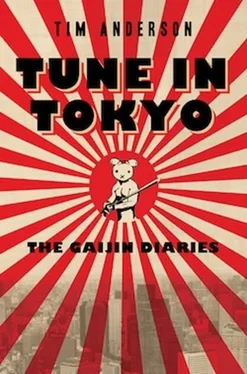Like almost every other aspect of life in this country, the “gay” thing isn’t easy to get to the, er, bottom of. There is no big dramatic coming out for the vast majority of Japanese gay people. Newly out of the closet queers don’t all of a sudden start wearing T-shirts that say, “Nobody knows I’m gay” or “I’m not gay, but my boyfriend is,” prancing around in pride rainbow colors and tight Lycra shirts, and forcing their same-sex lovers on their families at holidays.
Coming to terms with one’s homosexuality is a much more low-key and much less public affair. None of the gay guys I know in Japan have told their parents about their gayness, and none have plans to. I think this is a tragedy. If gay men in civilized countries have only one right to speak of (having relinquished all hope of ever having biological children, getting into a decent fistfight, or being tough on defense), it is the right to make a big cathartic announcement at an inopportune (preferably public) moment and force their friends and family to visualize them (1) engaging in sodomy and (2) marching half-naked in a parade. If a gay man has that right taken away, what on earth does he have?
Gay Japanese men who wish to maintain relations with their families will largely live as bachelors for the rest of their lives, and though their families will probably eventually figure it out from their love of shlocky pop radio, their coterie of hopelessly platonic female friends, and their love of gladiator movies, nothing will ever be said.
(Also, much to my displeasure, I’ve yet to meet a Japanese lesbian. Where are they hiding? How do they dress themselves, and more to the point, how do they style their hair?)
I ask my friend Shunsuke, who has a close relationship with his mother and brother (his father left when he was young), if he will ever high-kick his way out of those familial closet doors.
“My family have no doubt who I am,” he says.
“Oh, really? They know?”
“No, they always ask when I to get married.”
I exclaim that surely they realize that something is different about him. Like that he’s never had a girlfriend and always matches the color of his handbag with the color of his socks. Also, that he carries a handbag.
“Yes, but they no think about it. My grandmom don’t think gay people exist.”
“If you are different from the others in Japan, it is a really big burden on your life,” another gay friend Takahiro tells me. Taka’s reliably negative view of his countrymen never fails to make me feel happy not to be Japanese. “For many people, still, it is not really understandable that there are Japanese people who are gay. It would be much easier for Japanese people to accept and understand that you, Tim-san, are gay. Because, you know, you are weird anyway.”
Interesting. “Weird meaning non-Japanese, right?” I ask as Taka looks at me with furrowed brows and gives the typical Japanese response when the answer is no: “Mmmm…maybe.”
I get his point, though. It is much easier for me, a weird gaijin from another planet, to get away with being gay. We’re expected to be strange. It’s part of our culture. We also wear our shoes indoors and happily bathe in the same room we take dumps. It is much harder for a homegrown Japanese to get away with it. Unless, as Shunsuke points out, he works in the fashion industry.
“My mom think all gay people work in fashion. I no work in fashion. So, of course, I not gay.”
Once, a few weeks after I’d moved to Tokyo, I was on the train riding home to Koenji from Shinjuku. I was tired, and like everyone around me on the train, my eyes were rolling around beneath sinking eyelids and my head was beginning to bob and sink into the familiar sleeping-while-sitting-up position.
I woke myself up snoring, looked around to make sure nobody had noticed, and then decided to take out my book, which happened to be Haruki Murakami’s Underground , the uplifting and life-affirming story of the Tokyo sarin gas attack of 1996. I hadn’t been reading for long when I detected eyes on me. This is of course not unusual. With the number of pairs of eyeballs in this city, a few are bound to land on you and perhaps linger for a moment at some point, especially if your eyes are a piercing baby-blue like mine. I looked up and noticed that the eyeballs belonged to a young man sitting directly opposite me. He looked to be in his early twenties and was wearing a brown zip-up sweater, blue jeans, silver laceless sneakers, and on his head one of those trendy knitted hats that fit squarely on the head like an oversized yarmulke. He gazed at me nervously and darted his eyes around the carriage as if checking up on the other passengers.
I looked around the train also, fearing that he had heard me snoring and that perhaps I’d caused a disturbance in the carriage. I looked straight ahead again and our eyes met. He then winked his left eye as fast as the wing flap of a hummingbird-so fast that I couldn’t be sure it was a wink and not simply a nervous twitch-and once again darted his eyes in a different direction.
Am I being wooed? I wondered. What an interesting way of going about it. Normally in this situation I would prefer a potential suitor to smile at me handsomely and ask, “Is that a good book?” “Gosh, those are cool pants, where’d you get ’em?” or “I can kiss my own butt, how about you?” How would he have me answer this wink?
And was it actually a wink? God knows I’ve made horrible mistakes before when faced with an ambiguous gesture from an attractive male. Like the time in college when I was reading on a sofa in the library and became convinced that the frat boy making friendly faces and eyebrow wiggles at me was going to up and leave the girl he was sitting with, come over to me, and either propose or ask me to join him in the bathroom. (Turns out he was making those faces at someone sitting at a table behind me.) As is so often the case, I couldn’t be sure if this guy was flirting with me or simply having a spasm. I gave an uncomfortable and silent laugh in answer, his eyes dropped to the floor, and he scampered off the train at the next station, no doubt filled with shame for himself, his family, and his ancestral lineage.
So it wasn’t a spasm!
It makes cultural sense that homosexuality is not the most comfortable of subjects for the Japanese public to confront. There is a definite history of hot man-on-man action amongst the samurais of the Shogun era. But those times are long gone and do not really gel with life in modern Japan, with its belief in the importance of homogeneity, its dwindling birth rate, its aging population, and its preoccupation with safeguarding oneself and one’s family from any kind of public shame, like the kind that comes of being caught dancing to house music in a muscle-T at the club and singing into a hairbrush in one’s bedroom.
Overall, gay culture in Tokyo holds few surprises for anyone familiar with gay culture anywhere else. The gay district is called Ni Chome-“Second Street”-and is famous for being the best place in the city for a horny businessman to go to give and/or get a blowjob. Most places I’ve been to, like GB-the most popular bar for gay gaijin and the men who love them-really seem indistinguishable from any other big city gay place. Lots of useless diva dance music and power balladeering on the speakers, sinfully tight T-shirts on the bodies, and the smell of overpriced cologne mixed with cigarette smoke on every floating molecule of air. I don’t know exactly what I was hoping for, but I guess I wanted Japanese gay bars to offer something that I’d never before thought possible. I’ve always been frustrated with the mind-numbing predictability of the gay scene in general. The Japanese always take things and tweak them until they’re just weird enough. The mind boggles at what they could do with gay culture, already weird by definition. Like, instead of the obligatory gay uniform being tank tops and tight jeans, wouldn’t it be fun if it was hula-hoops and little pup tents? Or see-through kimono and banana hats? Fun, right?
Читать дальше












